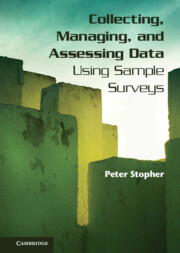Book contents
- Frontmatter
- Contents
- Figures
- Tables
- Acknowledgements
- 1 Introduction
- 2 Basic statistics and probability
- 3 Basic issues in surveys
- 4 Ethics of surveys of human populations
- 5 Designing a survey
- 6 Methods for conducting surveys of human populations
- 7 Focus groups
- 8 Design of survey instruments
- 9 Design of questions and question wording
- 10 Special issues for qualitative and preference surveys
- 11 Design of data collection procedures
- 12 Pilot surveys and pretests
- 13 Sample design and sampling
- 14 Repetitive surveys
- 15 Survey economics
- 16 Survey implementation
- 17 Web-based surveys
- 18 Coding and data entry
- 19 Data expansion and weighting
- 20 Nonresponse
- 21 Measuring data quality
- 22 Future directions in survey procedures
- 23 Documenting and archiving
- References
- Index
7 - Focus groups
Published online by Cambridge University Press: 05 June 2012
- Frontmatter
- Contents
- Figures
- Tables
- Acknowledgements
- 1 Introduction
- 2 Basic statistics and probability
- 3 Basic issues in surveys
- 4 Ethics of surveys of human populations
- 5 Designing a survey
- 6 Methods for conducting surveys of human populations
- 7 Focus groups
- 8 Design of survey instruments
- 9 Design of questions and question wording
- 10 Special issues for qualitative and preference surveys
- 11 Design of data collection procedures
- 12 Pilot surveys and pretests
- 13 Sample design and sampling
- 14 Repetitive surveys
- 15 Survey economics
- 16 Survey implementation
- 17 Web-based surveys
- 18 Coding and data entry
- 19 Data expansion and weighting
- 20 Nonresponse
- 21 Measuring data quality
- 22 Future directions in survey procedures
- 23 Documenting and archiving
- References
- Index
Summary
Introduction
A focus group represents a type of qualitative research, with roots in sociology. Focus groups were originally conceived by Robert K. Merton (Kaufman, 2003), although the name was apparently coined by Ernest Dichter (Ames, 1998). Focus groups have been used widely in marketing and advertising, but they also play an important role in the design and the evaluation of surveys. It is these latter uses of focus groups that are the primary focus of this chapter.
It is not the intent of this book to provide an exhaustive treatment of focus groups but, rather, to outline briefly what they are and how they are conducted, and to discuss where they fit in the survey design process and the evaluation of surveys. There are available numerous good resources describing precisely how to design and conduct a focus group (e.g., Krueger and Casey, 2000; McNamara, 1999; inter alia). This is not the purpose of this chapter. Focus groups have been used for some time in marketing (Morgan, 1988), as a means to test new concepts or ideas, to help design new products, etc. In the United States, the automotive industry has used focus groups for many years to assist in designing new model cars. Focus groups are also used in the medical profession (Powell and Single, 1996), though such use is in its infancy, according to Oz et al. (2006). Indeed, Oz et al. (2006) quote several different areas of medicine in which focus groups have been used, such as academic nursing, psychiatry, paediatrics, and behaviour-changing processes, such as quitting smoking. There are also references that can be found to investigations into cancer treatments (Frazier et al., 2010) and other specific patient areas and clinical studies. Focus groups are used extensively in the social sciences. However, the specific use of focus groups that is the subject of this chapter is that of assisting in the design and evaluation of surveys. The different disciplines that use focus groups also use different approaches to the design of focus groups and the mechanisms for using them. In this chapter, the ways in which they can be used to assist in the design and evaluation of surveys are considered specifically and those approaches that are best suited to this are discussed. Other uses of focus groups may be more suited to using different approaches.
- Type
- Chapter
- Information
- Collecting, Managing, and Assessing Data Using Sample Surveys , pp. 127 - 136Publisher: Cambridge University PressPrint publication year: 2012



